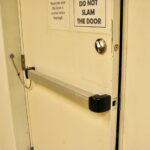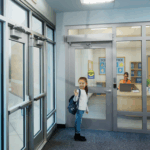
Emergency fire exit door and aluminum composite wall of warehouse.
Door closers are common on exterior doors – for security, weather, and to save moms everywhere from constantly having to yell, “Were you raised in a barn???” The question is…
Is it a code requirement for non-fire-rated exterior doors to have door closers?
I have never seen this requirement in the model codes or referenced standards, BUT I did find it in the International Energy Conservation Code (IECC). So the answer to the question depends on whether a specific jurisdiction has adopted an energy code, and whether that code requires exterior doors to be self-closing.
Here is the applicable paragraph from the 2018 IECC (which also requires a vestibule, with some exceptions):
C402.5.7 Vestibules. Building entrances shall be protected with an enclosed vestibule, with all doors opening into and out of the vestibule equipped with self-closing devices. Vestibules shall be designed so that in passing through the vestibule it is not necessary for the interior and exterior doors to open at the same time. The installation of one or more revolving doors in the building entrance shall not eliminate the requirement that a vestibule be provided on any doors adjacent to revolving doors.
According to this section of the IECC, vestibules are not required for the following locations:
- Buildings in Climate Zones 1 and 2 (click here for a map).
- Doors that are not intended for use by the public, such as doors to mechanical or electrical equipment rooms, or doors that are intended solely for employee use.
- Doors which open to the exterior directly from a sleeping unit or dwelling unit.
- Doors that open directly to the exterior from a space less than 3,000 square feet (298 m2) in area.
- Revolving doors.
- Doors used primarily movement of vehicles or material handling, and adjacent personnel doors.
- Doors that have an air curtain meeting the requirements of the IECC.
It’s unclear (at least to me) whether the doors in these exempt locations still have to be self-closing, but the IECC specifically says that these locations are exempt from the requirement for a vestibule. The code does not state whether the doors are exempt from the requirement for a door closer, so normally that would mean that they are not exempt from that requirement.
You need to login or register to bookmark/favorite this content.






Lori,
Clearly the section you cited only applies to doors in vestibules, and the exceptions rule out a lot. Do non-vestibule exterior doors require closers? Not on this citation.
Paul DeBaggis
Certified Building Official
Hi Paul –
I do not see another code section that would require a door that is exempt from the vestibule requirement to be self-closing, and there is nothing in the Commentary about it. So is the intent of the energy code to allow doors to be left open if they are serving the spaces that are exempt from the vestibule requirement? What do you think? I really appreciate your insight.
– Lori
Do you think the IECC will be referenced in the IBC in the near future?
Hi Eric –
It’s actually already referenced. Chapter 13 of the IBC (in its entirety) states:
SECTION 1301 – GENERAL
[E] 1301.1 Scope. This chapter governs the design and construction of buildings for energy efficiency.
[E] 1301.1.1 Criteria. Buildings shall be designed and constructed in accordance with the International Energy Conservation Code.
– Lori
Thank you!
Florida SREF (State Rules for Educational Facilities) chapter 5 requires closers on doors subject to wind exposure
the door closer will help keep it closed so the wind does not rip it off/damage it. it is well worth the money if that is the reason not to have a closer on an exterior door.
We have an architectural firm that has to regularly be told that doors with exit devices need closers due to the inability to grasp the hardware and control the door swing. Shake my head every time!
A quick check shows only Nevada has adopted 2018 IECC. (Not checked if this list is accurate).
https://www.energycodes.gov/state-code-adoption-tracking-analysis
Hi Dan –
It looks like that requirement has been in the IECC since the 2003 edition, so it would affect jurisdictions that have adopted past editions as well. Your link is a great resource!
– Lori